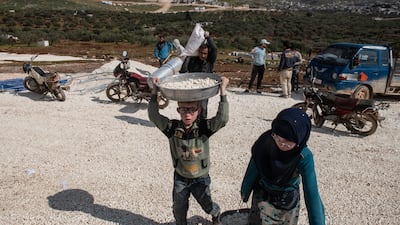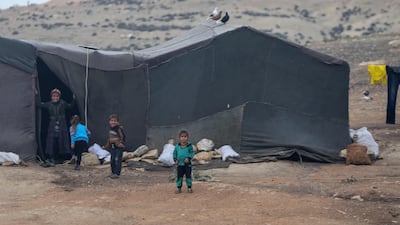Every day, residents of Damascus wake to see crammed rows of fuel-thirsty cars and angry drivers lining roads near idle petrol stations. Some push their cars on foot, braving the cold.
After weeks of inactive transport links and skyrocketing fuel costs, Syria’s nationwide fuel shortage has triggered a mini-crisis within the wider economic downturn.
The fuel shortage — the worst in the 11-year-long war — shows no sign of abating as cash-strapped Syrian authorities lack the funds to buy Iranian oil. Tehran has stopped the flow, cutting off a crucial lifeline for the already struggling economy.
While announcing a marked increase in fuel prices, Syrian Prime Minister Hussein Arnous let slip that the issue was primarily a financial one, saying: “Any decision taken to raise the price is a difficult decision, but the imposed conditions are more severe and harsh. We were faced with two options, either to lose the oil supply from the markets or to increase their price in a simple way that would help secure them.”
In addition to the lack of cash, energy prices have spiked globally as a consequence of the Ukraine war, and within Syria, continued control of the biggest oilfields by the US-backed Syrian Democratic Forces (SDF) in the north-east has also cut supplies.
Wavering fuel supplies have led to prices being raised sharply by the state. The price of subsidised Octane 90 petrol has been upped from 2,500 Syrian pounds a litre (about $1) to 3,000 pounds; Octane 95 has been set at 5,300 pounds, up from 4,000, while state salaries in Syria average about 120,000 Syrian pounds ($20) a month.
Consequently, government institutions have struggled to function as employees struggle to find transport, bakeries have shut and even the Syrian football and basketball leagues have been postponed until the end of the year as teams are not able to travel.
Ahmad Hamdan, 26, is a taxi driver working in the capital. He told The National that the economic situation has killed his business.
“Winter has its issues with fuel, but never like this, I’m barely making enough to feed my family and if someone has 10 litres of petrol, they are a king, a sultan even, this is where we are today, a car, mouths of feed but no petrol and I have to fight every day to get it.”
Rising prices have wreaked havoc on Syria’s struggling economy. A cooking gas cylinder is now being sold on the black market for 250,000 SYP ($40), a 40 per cent rise on the 100,000 asked a few weeks ago, and Ahmad sees little possibility of an improvement.
“I am 26 years old and this is the worst situation — I can barely pay my rent, and I have a family to feed, our eyes are popping out just making ends meet, we're dying a slow death, they [Syrian authorities] need to sort it out, sanctions play a part as well.”
Residents of Damascus are now feeling the pinch more than ever, as worsening economic conditions have led to a sharp rise in people sharing accommodation, as families share skyrocketing costs of food and fuel.
But the tightening of wallets will be difficult. Prices have started to go through the roof at a time when many Syrians are spending the cold winter at home, as ministers have cancelled work on Saturdays and ceased overtime until January.
There has been a 30 per cent increase in the price of commodities and food in the last two months, while the Syrian pound has exceeded 6,000 to the US dollar for the first time since records began.
Coinciding with the approach of Christmas, the prices of clothes and shoes in the markets of Damascus has also risen to a new high, with some basic items costing more than 200,000 Syrian pounds, almost 30 per cent more than an average monthly state salary. Meanwhile, internet prices have increased by 20 per cent.
Elsewhere in Syria, the situation is the same. Butchers in Qunaitra, a governorate in the south-west, have raised the price of red meat. Hamdi Al Ali, director of domestic trade and consumer protection, confirmed that prices would be raised by 25 per cent to make up for increasing fuel costs.
The Syrian Ministry of Foreign Affairs has shifted the blame for the economic crisis on to the US.
A strong-worded statement said that “the American occupation forces and the militias associated with it continue their systematic looting of oil, wheat and other basic resources and the national wealth of the Syrian people.”
“The total value of the losses of the Syrian oil sector amounts to “111.9 billion dollars.”
It is unclear however, how the government arrived at this figure. In 2008, Syria produced 406,000 barrels of oil per day, but after the conflict started in 2011 oil production dropped to 353,000 bpd, eventually collapsing to just 24,000 bpd as Russian and western air forces began bombing oil infrastructure that was captured by ISIS.
Before the war, Syria generated $3.2 billion in oil sales for 2010. The Syrian Democratic Forces, a mostly Kurdish US-backed militia, now control 90 per cent of oil production and more than 50 per cent of gasfields.
Health is another sector that is reeling from rising fuel costs, with medicine prices increasing by 20 to 27 per cent for all major drugs. For many affected families this is catastrophic.
Mira Saloum, 28, a health worker in Latakia on the country's Mediterranean coast, cares for her elderly grandmother and her father who suffers from high blood pressure and cardiac irregularities.
She told The National: “The rise in pharmaceutical expenses is directly linked to the fuel situation, companies are not able to maintain smooth supply and the big tycoons want to suck as much money as possible from us, how can you live without heart medication or insulin?”
As the shattered economy limps on, 90 per cent of the population Syrians are now living below the international poverty line.
Sinopharm vaccine explained
The Sinopharm vaccine was created using techniques that have been around for decades.
“This is an inactivated vaccine. Simply what it means is that the virus is taken, cultured and inactivated," said Dr Nawal Al Kaabi, chair of the UAE's National Covid-19 Clinical Management Committee.
"What is left is a skeleton of the virus so it looks like a virus, but it is not live."
This is then injected into the body.
"The body will recognise it and form antibodies but because it is inactive, we will need more than one dose. The body will not develop immunity with one dose," she said.
"You have to be exposed more than one time to what we call the antigen."
The vaccine should offer protection for at least months, but no one knows how long beyond that.
Dr Al Kaabi said early vaccine volunteers in China were given shots last spring and still have antibodies today.
“Since it is inactivated, it will not last forever," she said.
Quick facts on cancer
- Cancer is the second-leading cause of death worldwide, after cardiovascular diseases
- About one in five men and one in six women will develop cancer in their lifetime
- By 2040, global cancer cases are on track to reach 30 million
- 70 per cent of cancer deaths occur in low and middle-income countries
- This rate is expected to increase to 75 per cent by 2030
- At least one third of common cancers are preventable
- Genetic mutations play a role in 5 per cent to 10 per cent of cancers
- Up to 3.7 million lives could be saved annually by implementing the right health
strategies
- The total annual economic cost of cancer is $1.16 trillion
Jetour T1 specs
Engine: 2-litre turbocharged
Power: 254hp
Torque: 390Nm
Price: From Dh126,000
Available: Now
Western Clubs Champions League:
- Friday, Sep 8 - Abu Dhabi Harlequins v Bahrain
- Friday, Sep 15 – Kandy v Abu Dhabi Harlequins
- Friday, Sep 22 – Kandy v Bahrain
House-hunting
Top 10 locations for inquiries from US house hunters, according to Rightmove
- Edinburgh, Scotland
- Westminster, London
- Camden, London
- Glasgow, Scotland
- Islington, London
- Kensington and Chelsea, London
- Highlands, Scotland
- Argyll and Bute, Scotland
- Fife, Scotland
- Tower Hamlets, London
Benefits of first-time home buyers' scheme
- Priority access to new homes from participating developers
- Discounts on sales price of off-plan units
- Flexible payment plans from developers
- Mortgages with better interest rates, faster approval times and reduced fees
- DLD registration fee can be paid through banks or credit cards at zero interest rates
COMPANY%20PROFILE
%3Cp%3E%3Cstrong%3ECompany%20name%3A%3C%2Fstrong%3E%20Clinicy%3Cbr%3E%3Cstrong%3EStarted%3A%3C%2Fstrong%3E%202017%3Cbr%3E%3Cstrong%3EFounders%3A%3C%2Fstrong%3E%20Prince%20Mohammed%20Bin%20Abdulrahman%2C%20Abdullah%20bin%20Sulaiman%20Alobaid%20and%20Saud%20bin%20Sulaiman%20Alobaid%3Cbr%3E%3Cstrong%3EBased%3A%3C%2Fstrong%3E%20Riyadh%3Cbr%3E%3Cstrong%3ENumber%20of%20staff%3A%3C%2Fstrong%3E%2025%3Cbr%3E%3Cstrong%3ESector%3A%3C%2Fstrong%3E%20HealthTech%3Cbr%3E%3Cstrong%3ETotal%20funding%20raised%3A%3C%2Fstrong%3E%20More%20than%20%2410%20million%3Cbr%3E%3Cstrong%3EInvestors%3A%3C%2Fstrong%3E%20Middle%20East%20Venture%20Partners%2C%20Gate%20Capital%2C%20Kafou%20Group%20and%20Fadeed%20Investment%3C%2Fp%3E%0A
More on Palestine-Israeli relations
MATCH INFO
Champions League quarter-final, first leg
Ajax v Juventus, Wednesday, 11pm (UAE)
Match on BeIN Sports
Dubai Rugby Sevens, December 5 -7
World Sevens Series Pools
A – Fiji, France, Argentina, Japan
B – United States, Australia, Scotland, Ireland
C – New Zealand, Samoa, Canada, Wales
D – South Africa, England, Spain, Kenya
ALRAWABI%20SCHOOL%20FOR%20GIRLS
%3Cp%3ECreator%3A%20Tima%20Shomali%3C%2Fp%3E%0A%3Cp%3EStarring%3A%C2%A0Tara%20Abboud%2C%C2%A0Kira%20Yaghnam%2C%20Tara%20Atalla%3C%2Fp%3E%0A%3Cp%3ERating%3A%204%2F5%3C%2Fp%3E%0A
Global Fungi Facts
• Scientists estimate there could be as many as 3 million fungal species globally
• Only about 160,000 have been officially described leaving around 90% undiscovered
• Fungi account for roughly 90% of Earth's unknown biodiversity
• Forest fungi help tackle climate change, absorbing up to 36% of global fossil fuel emissions annually and storing around 5 billion tonnes of carbon in the planet's topsoil
Election pledges on migration
CDU: "Now is the time to control the German borders and enforce strict border rejections"
SPD: "Border closures and blanket rejections at internal borders contradict the spirit of a common area of freedom"
UAE SQUAD
Khalid Essa, Ali Khaseif, Fahad Al Dhanhani, Adel Al Hosani, Bandar Al Ahbabi, Mohammad Barghash, Salem Rashid, Khalifa Al Hammadi, Shaheen Abdulrahman, Hassan Al Mahrami, Walid Abbas, Mahmoud Khamis, Yousef Jaber, Majed Sorour, Majed Hassan, Ali Salmeen, Abdullah Ramadan, Abdullah Al Naqbi, Khalil Al Hammadi, Fabio De Lima, Khalfan Mubarak, Tahnoon Al Zaabi, Ali Saleh, Caio Canedo, Ali Mabkhout, Sebastian Tagliabue, Zayed Al Ameri
Gothia Cup 2025
4,872 matches
1,942 teams
116 pitches
76 nations
26 UAE teams
15 Lebanese teams
2 Kuwaiti teams
Brahmastra%3A%20Part%20One%20-%20Shiva
%3Cp%3E%3Cstrong%3EDirector%3A%20%3C%2Fstrong%3EAyan%20Mukerji%3C%2Fp%3E%0A%3Cp%3E%3Cstrong%3EStars%3A%20%3C%2Fstrong%3ERanbir%20Kapoor%2C%20Alia%20Bhatt%20and%20Amitabh%20Bachchan%3C%2Fp%3E%0A%3Cp%3E%3Cstrong%3ERating%3A%3C%2Fstrong%3E%202%2F5%3C%2Fp%3E%0A
Killing of Qassem Suleimani
The specs
- Engine: 3.9-litre twin-turbo V8
- Power: 640hp
- Torque: 760nm
- On sale: 2026
- Price: Not announced yet
Key facilities
- Olympic-size swimming pool with a split bulkhead for multi-use configurations, including water polo and 50m/25m training lanes
- Premier League-standard football pitch
- 400m Olympic running track
- NBA-spec basketball court with auditorium
- 600-seat auditorium
- Spaces for historical and cultural exploration
- An elevated football field that doubles as a helipad
- Specialist robotics and science laboratories
- AR and VR-enabled learning centres
- Disruption Lab and Research Centre for developing entrepreneurial skills
THE SPECS
Engine: 1.5-litre
Transmission: 6-speed automatic
Power: 110 horsepower
Torque: 147Nm
Price: From Dh59,700
On sale: now
The%20specs
%3Cp%3E%3Cstrong%3EEngine%3A%3C%2Fstrong%3E%202-litre%204-cylinder%3Cbr%3E%3Cstrong%3EPower%3A%20%3C%2Fstrong%3E153hp%20at%206%2C000rpm%3Cbr%3E%3Cstrong%3ETorque%3A%20%3C%2Fstrong%3E200Nm%20at%204%2C000rpm%3Cbr%3E%3Cstrong%3ETransmission%3A%20%3C%2Fstrong%3E6-speed%20auto%3Cbr%3E%3Cstrong%3EFuel%20consumption%3A%20%3C%2Fstrong%3E6.3L%2F100km%3Cbr%3E%3Cstrong%3EPrice%3A%20%3C%2Fstrong%3EDh106%2C900%3Cbr%3E%3Cstrong%3EOn%20sale%3A%20%3C%2Fstrong%3Enow%3C%2Fp%3E%0A
The burning issue
The internal combustion engine is facing a watershed moment – major manufacturer Volvo is to stop producing petroleum-powered vehicles by 2021 and countries in Europe, including the UK, have vowed to ban their sale before 2040. The National takes a look at the story of one of the most successful technologies of the last 100 years and how it has impacted life in the UAE.
Read part four: an affection for classic cars lives on
Read part three: the age of the electric vehicle begins
Read part one: how cars came to the UAE
More from Rashmee Roshan Lall





